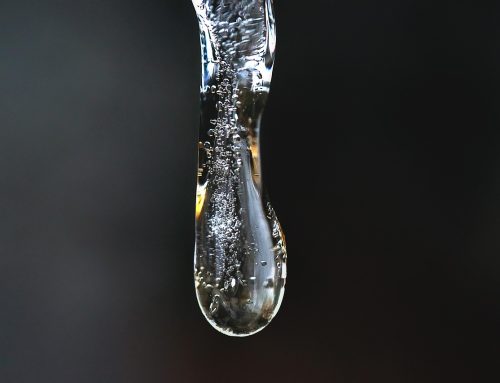Bathroom drain blockages are a problem that almost every household faces sooner or later. These annoying situations not only cause inconvenience in everyday life, but can also lead to significant expenses if not treated in time. There are many reasons behind their occurrence, such as the accumulation of hair, soap scum, grease and oils, as well as the pouring of inappropriate objects such as paper towels and hygiene products.
According to statistics, the average household experiences a clogged drain at least once a year, which can cost not only time and energy, but also a significant amount of money to call in a professional. This amount can vary from country to country and city to city, depending on how severe the blockage is and what methods can be used to remove it.
However, prevention is always better than cure. Proper maintenance routines and conscious use will allow us to keep our bathrooms clean and tidy in the long term, avoiding unnecessary costs and unpleasant surprises. Below we detail how we can prevent the most common causes of bathroom drain blockages, while maintaining the comfort and cost-effectiveness of our homes.
A well-planned maintenance plan will not only prevent drain blockages, but will also contribute to a longer lifespan of the drainage system, reducing the need for major and costly repairs. Understanding the root cause of the problem and taking proactive action can save time, money and energy for any household in the long run.
In this section, we aim to introduce the common causes of bathroom drain blockages and the importance of preventing them. In the following sections, we will also go into detail about specific steps we can take to ensure that our bathroom drains always remain clean and free-flowing.
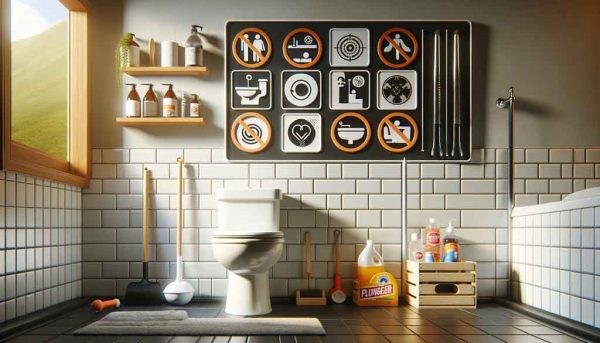
Using filters
One of the easiest and most cost-effective ways to prevent drain clogs is to use the right filters. These small but effective devices are designed to prevent hair, soap scum, and other solids from entering your drain, which can cause blockages.
Types of filters to install in drains and their benefits
Silicone filters: These filters are flexible, easily fit into drains of different sizes, and are great at catching hair and other small objects. One of their biggest advantages is that they are easy to clean – just lift them out of the drain, clean them, and put them back in.
Metal filters: Filters made of steel or copper are extremely durable and long-lasting. Metal filters are especially suitable for kitchen drains, where larger debris, such as food scraps, can be present.
Ceramic filters: Although less commonly used, ceramic filters add an elegant look to your bathroom or kitchen. They are easy to clean and effectively filter out unwanted contaminants.
Tips for choosing and maintaining the right filter
Personalized Choice: Choose a filter based on the type of drain you have and the most common contaminants. For example, if hair is the main problem, a silicone filter may be the best choice.
Regular cleaning: Clean the filter at least once a week to prevent dirt from building up. Some filters can be washed directly under the tap, while others require a soft brush or sponge.
Replace when necessary: Although filters can be long-lasting, they can become worn or damaged over time. Check the condition of the filter regularly and replace it when necessary to ensure the drain protection.
Using filters not only helps prevent drain blockages, but also contributes to bathroom and to maintain a more hygienic kitchen. This saves you time and money while maintaining the comfort and cleanliness of your home.
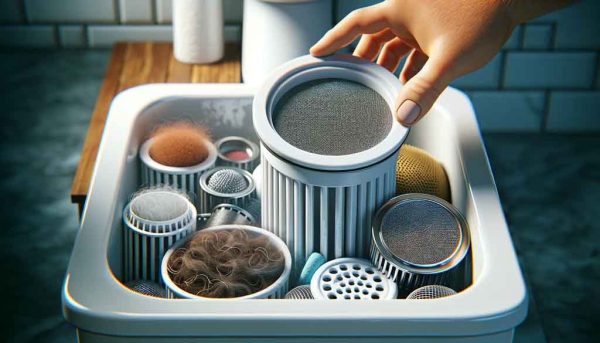
Regular cleaning
Regular cleaning and maintenance are key to preventing clogged bathroom drains. A simple but highly effective way to keep your drains in good condition is to use hot water and natural cleaning products. Let's see how we can apply these methods in our homes.
Hot water to dissolve deposits and grease
Hot water is one of the easiest and cheapest ways to loosen grease and other grime. Pour hot water directly down your drain once a week. This will help dissolve grease and oils that can build up on the walls of your pipes and cause blockages. Using hot water can be especially effective in kitchen drains, where grease is common.
Recommended drain cleaners and natural alternatives
Commercial drain cleaners: There are many effective drain cleaners available on the market that are specifically designed to clean drains and prevent clogs. It is important to use these products with caution and always follow the manufacturer's instructions, as some chemicals can be harmful to pipes or the environment.
Natural Alternatives: A combination of vinegar and baking soda is a great, eco-friendly solution for unclogging your drain. Simply pour half a cup of baking soda down the drain, then add half a cup of vinegar. Let the mixture sit for 10-15 minutes, then rinse with hot water. This method will not only dissolve deposits and grease, but it can also eliminate unpleasant odors.
These regular cleaning methods not only prevent drain blockages, but also maintain the health of drains and pipes in the long term, while also being environmentally friendly.
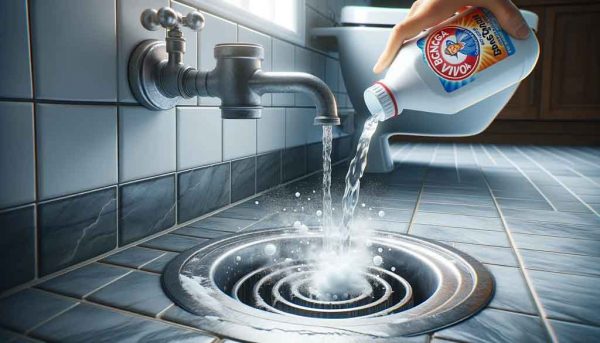
Handling of greasy materials
Pouring greasy and oily substances down the drain is one of the most common causes of clogged drains, especially in the kitchen. When fats and oils cool and solidify, they coat the inside of the pipes, reducing their permeability, which eventually causes blockages. In addition, this type of contamination is an ideal breeding ground for certain bacteria, which can also lead to the development of unpleasant odors.
Why we should avoid pouring greasy, oily substances down the drain
Clogs caused by fats and oils are not only an inconvenience, but can also cause serious damage to the water pipe systems, which can be costly to repair. A 2019 study found that drain blockages caused by fats and oils cost households and municipalities in the United States millions of dollars each year.
Alternatives for dealing with greasy waste in the kitchen
Using grease traps: Pour used grease and oil into a sealable container, such as an old can or plastic container, and once it solidifies, throw it in the trash.
Composting: Certain types of vegetable-based oils, such as sunflower or olive oil, can be composted. However, this is only recommended in small quantities, as too much oil can upset the balance of the compost.
Recycling: Available in more and more places service, where larger quantities of cooking oil and fat are recycled, for example to produce biodiesel. Find out about local opportunities!
The key to avoiding problems caused by fats and oils is awareness and prevention. By applying the above methods, we can not only protect our drains, but also our environment.
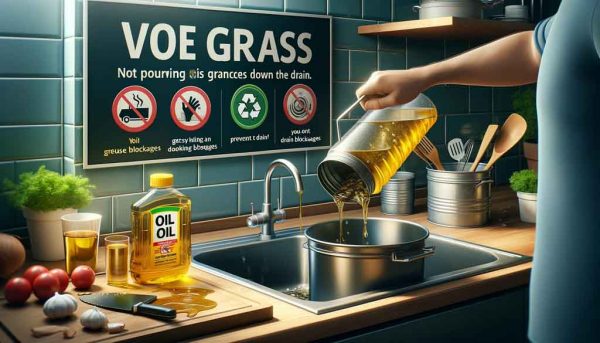
Hair removal
Hair is a common cause of clogged bathroom drains. This is especially true in households where several people share a bathroom. Hair, especially when combined with soap scum and other debris, can easily get stuck on the inside of the drain, causing serious blockages over time. Fortunately, there are some simple but effective ways to prevent this problem.
Practical ways to use hair collectors
Hair Catchers: There are many types of hair catchers on the market that can be placed directly on the drain. These devices are designed to catch hair before it reaches the deeper parts of the drain. Whether they are made of silicone, metal or plastic, it is important to clean them regularly, preferably after each use.
Brushing your hair before showering: A simple but often overlooked way to remove hair is to brush your hair thoroughly before showering. This will ensure that most of the loose hair ends up on the brush, not in the drain.
The importance of regular hair removal in preventing blockages
Regular hair removal not only plays a key role in preventing drain blockages, but also contributes to maintaining overall bathroom hygiene. According to a 2020 survey, nearly 60% of households experience a drain blockage at least once a year, a significant portion of which is caused by hair. By regularly removing hair, we can significantly reduce the chance of blockages developing, thereby saving time and money.
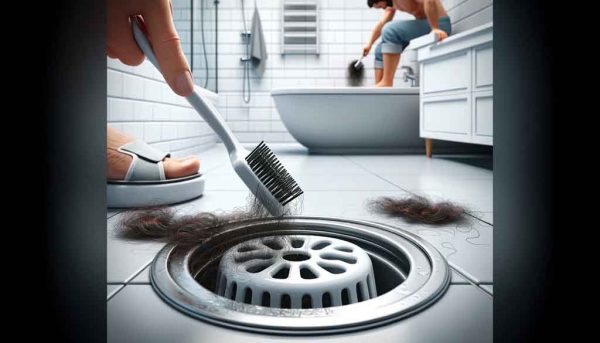
Beware of non-biodegradable materials
One of the main causes of clogged bathroom and kitchen drains is the intentional or accidental dumping of non-biodegradable materials. These materials can include everything from traditional household waste like paper towels, cotton buds, and hygiene products, to less obvious things like coffee grounds and larger food scraps. These materials don’t dissolve in water, so they can easily clog drains and sewer systems.
What objects and materials should not be thrown down the drain?
- Paper towels and cotton swabs: While these materials may seem lightweight, they do not break down in water, so they can clog your drain.
- Hygiene products: Tampons, pads, and wipes are particularly notorious for causing blockages in the drainage system.
- Food scraps: Larger pieces of food, such as vegetable scraps and coffee grounds, can also be a serious problem.
- Paints and chemicals: These can not only clog drains, but also damage the sewer system and the environment.
The impact of non-degradable materials on the drain and sewer system
Non-biodegradable materials can not only clog your own home's drains, but can also contribute to wider sewer system problems, such as the formation of 'fat mountains', which can severely disrupt wastewater treatment systems. Their treatment often comes at a high cost, which can ultimately be passed on to taxpayers.
A 2018 report estimated that the UK spends around £15 million a year just to remove grease traps from its sewer system. These problems are not only costly, but also cause environmental pollution when sewage overflows and enters natural waters.
Conscious use and proper management of non-biodegradable materials is essential to protect drains and the wider environment.
Judicious use of chemicals
Drain cleaners can offer a quick and effective solution to clogs, but it's important to use them wisely. They can have a significant impact not only on the condition of your drains and pipes, but also on the environment.
The impact of drain cleaners on pipes and the environment
Drain cleaning chemicals contain aggressive ingredients that can dissolve grease, hair, and other contaminants. While these products may clear blockages quickly, they can damage the inner surface of your water pipes in the long run, especially if they are old or made of sensitive materials.
Furthermore, these chemicals end up in wastewater treatment plants, where they can hinder the water purification process, or even find their way into natural waters, harming wildlife. According to a 2017 study, certain compounds found in drain cleaners negatively affect the development and reproduction of aquatic organisms.
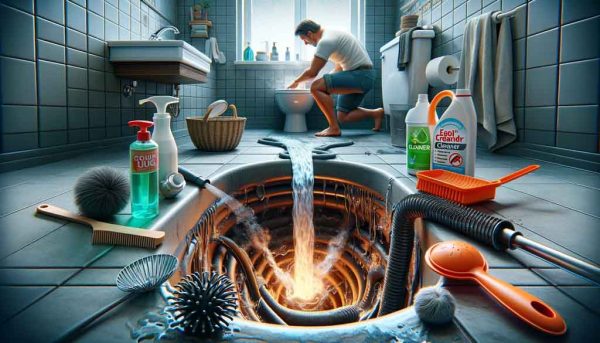
How to choose and use drain cleaners responsibly
- Read the label carefully: Choose the mildest product possible that is still effective for the problem. Avoid overly aggressive chemicals if possible.
- Use only when necessary: Only use drain cleaners if common home methods such as hot water, vinegar, or a plunger are not effective.
- Natural alternatives: Before you reach for chemicals, try a combination of baking soda and vinegar or hot water. These can often be just as effective, with less risk to your pipes and the environment.
- Eco-friendly products: Look for drain cleaners specifically labeled as eco-friendly, which are less harmful.
Making a smart and conscious decision when using drain cleaners can not only preserve the condition of your home's pipes, but can also contribute to protecting our environment.
Regular inspection and maintenance
One of the most critical points in a bathroom is the drainage system. Regular inspection and maintenance are essential for early detection and prevention of problems. Preventive measures not only avoid inconvenience and damage, but also save money in the long run.
How to recognize drain problems at an early stage
Slow drain: If you notice that the water is draining more slowly than usual, this could be the first sign of a blockage.
Bad odors: Unpleasant odors can also indicate that dirt has accumulated in the drain, causing bacteria to grow.
Water backflow: If the water is not draining properly and possibly flowing back, it indicates a serious blockage.
Noises: Strange rumbling and bubbling sounds can also indicate that something is wrong with the drain.
Tips for regularly inspecting your bathroom and preventing problems
- Regular visual inspection: Monitor the condition of your drains and look for signs that may indicate a problem.
- Using hot water: Pour hot water down the drain weekly to help dissolve grease and other dirt buildup.
- Clean filters regularly: Clean drain filters regularly to prevent hair and other debris from accumulating.
- Avoid pouring harmful substances down the drain: Never pour greasy, oily substances or non-degradable objects down the drain.
- Professional use: If the problem is more serious and the tips above do not work, contact a professional.
Regular inspection and maintenance can help ensure that your bathroom drainage system operates smoothly in the long term.
Toilet paper usage
THE toilet-proper use of paper towels is essential in preventing bathroom drain blockages. Although toilet-paper is designed to degrade to some extent in water, excessive use or choosing the wrong types can cause problems.
The importance of using toilet paper and how to avoid overdoing it
Toilet paper is essential for maintaining personal hygiene, but it's important to use it wisely. Overuse is not only unnecessary, but can also clog the toilet and strain the plumbing system.
Statistics: Research shows that the average person uses around 20 kg of toilet paper per year, which places a significant burden on wastewater treatment systems worldwide.
Tips to avoid clogs when using toilet paper
- Use only as much as you need: Try to be economical with your toilet paper usage, only using as much as is absolutely necessary.
- Choose biodegradable paper: Types of toilet paper that decompose quickly can help avoid clogs, especially in systems that are more prone to problems.
- Beware of “wet wipes”: Although many people use them as an alternative to toilet paper, many wet wipes do not decompose and can cause serious clogs in toilets and sewer systems.
- Regular maintenance: Regular maintenance of the toilet and drain, such as flushing with hot water, can help prevent clogs.
Conscious use of toilet paper and application of the above tips can not only prevent drain blockages, but can also contribute to more sustainable water management in the long term.
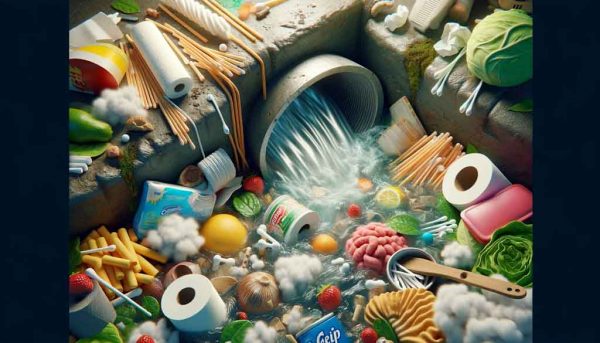
The importance of ventilation
Proper ventilation in the bathroom is key to preventing condensation and mold. The moisture that is created when bathing, showering, or even washing clothes creates an ideal environment for mold and mildew to grow. Not only do they ruin the aesthetics of your home, they can also be harmful to your health, especially for those with allergies or respiratory problems.
The role of proper ventilation in preventing condensation and mold
Proper ventilation helps reduce humidity in the air, preventing mold and condensation on walls and mirrors. A 2019 study found that well-ventilated bathrooms have significantly lower concentrations of mold and fungus than poorly ventilated ones.
Tips for effective bathroom ventilation
- Use an exhaust fan: A bathroom fan can help remove moisture quickly. Make sure the fan is venting the moist air to the outside, not just another interior space.
- Open the windows: Whenever possible, use windows to promote natural ventilation.
- Keep the door open: After bathing or showering, if weather and privacy allow, keep the bathroom door open to help air flow.
- Dry the surfaces: Use a cloth or sponge to dry the surfaces around the shower and tub, reducing the chance of mold growth.
- Regular cleaning: Clean your bathroom regularly, paying special attention to areas prone to mold, such as tile grout.
Proper ventilation not only plays an important role in preventing mold and condensation, but also contributes to maintaining a bathroom with fresh and healthy air.
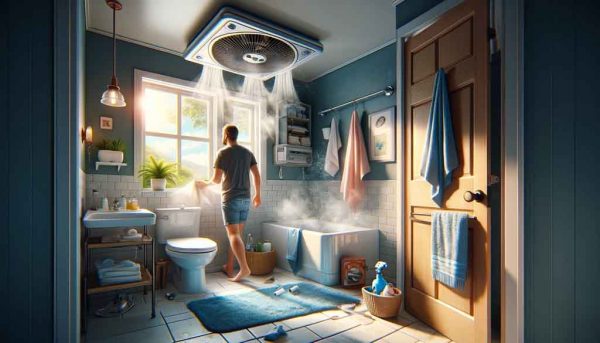
Seeking professional help
While many bathroom drain clogs and problems can be fixed at home, there are situations when it is essential to seek professional help. Professionals can not only fix problems quickly and effectively, but they can also provide valuable advice on how to avoid future problems.
When to contact a professional for drain blockages and other problems
- Recurring Clogs: If a drain becomes clogged regularly, it could mean there is a deeper problem that only a professional can fix.
- Severe Clog: If standard methods like using a plunger or applying drain cleaners don't solve the problem, it's time to call a professional.
- Water backflow: If water is flowing back from the drain, this may indicate a serious problem that requires immediate professional intervention.
- Bad odors: If you constantly smell bad odors coming from your drain that cannot be easily eliminated, you probably need a professional.
How to choose a reliable professional to effectively deal with problems
- Recommendations: Ask for recommendations from friends, family, or by reading online reviews. A good reputation is key.
- Professional licenses: Make sure the professional has the necessary licenses and insurance.
- Experience: It is important that the chosen professional has sufficient experience, especially in dealing with the type of problem at hand.
- Quote and guarantee: Request quotes from several service providers and inquire about the guarantee of the work.
- Communication: A good professional will readily answer your questions and clearly communicate the steps to resolve the problem.
Choosing the right professional increases the chances of the problem being resolved quickly and effectively, avoiding future problems.
Summary
Preventing bathroom drain blockages is not only important for convenience, but it also helps to keep your home hygienic and your maintenance costs low. Below we have summarized some key advice and tips that will help you avoid common drain problems.
The importance of prevention
Applying the tips mentioned above can help prevent clogged drains and other bathroom problems, ensuring your bathroom runs smoothly. Remember, prevention is always cheaper and less time-consuming than treating a problem afterwards.
Following these steps will not only help you maintain a hygienic and clean bathroom, but it will also save you time and money in the long run.
Need help? Search us at one of our contact numbers, we are at your disposal every day of the year!



